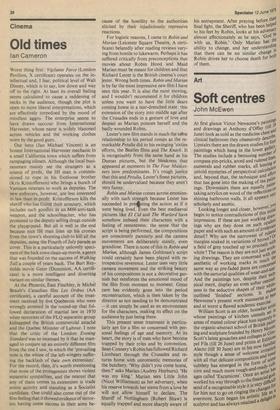Cinema
Old times
Ian Cameron
Worst thing first: Vigilante Force (London Pavilion, X certificate) operates on the intellectual and, I fear, political level of Walt Disney, which is to say, low down and way off to the right. At least its overall feeling seems calculated to cause a reddening of necks in the audience, though the plot is open to more liberal interpretations, which are effectively torpedoed by the mood of mindless aggro. The enterprise seems to have drawn succour from International Harvester, whose name is widely blazoned across vehicles and the working clothes worn by the good guys.
Our hero (Jan Michael Vincent) is an honest International Harvester mechanic in a small California town which suffers from rampaging oilmen. Although the local businessmen mainly see the strangers as a source of profit, the IH man is commissioned to rope in his footloose brother (Kris Kristofferson) who brings a bunch of Vietnam veterans to work as deputies. The new enforcers, however, are less interested in law than in profit. Kristofferson kills the sheriff who has found their armoury, which includes such goodies as an M66 anti-tank weapon, and the schoolteacher, who has protested to the deputy selling drugs outside the playground. But all is well in the end because nice III man lines up his cronies from the town's shooting club to kill all the deputies, using the Fourth of July parade as cover. This is a particularly unlovely specimen of the hick town clean-up movie, a genre that was founded on the success of Walking Tall a couple of years back. The Burt Reynolds movie Gator (Dominion, AA certificate) is a more intelligent and diverting variant on similar themes.
At the Phoenix, East Finchley, is Michel Brault's Canadian film Les Ordres (AA certificate), a careful account of the treatment received by five Quebecois who were wrongly arrested in the round-up that followed declaration of martial law in 1970 when terrorists of the FLQ separatist group kidnapped the British commercial attaché and the Quebec Minister of Labour. I note that the critic of the London Evening Standard was so incensed by it that he managed to conjure up an entirely different film from the one I saw, in which the 'prevailing note is the whine of the left-wingers suffering the backlash of their own extremism'. For the record, then, it's worth mentioning that none of the protagonists shows violent separatist sympathies, and the nearest that any of them comes to extremism is trade union activity and standing as a Socialist candidate. One could also come out of the film feeling that it showed evidence of terrorists having some success in their aims be
cause of the hostility to the authorities elicited by their injudiciously repressive reactions.
For logistic reasons, I came to Robin and Marian (Leicester Square Theatre, A certi
ficate) belatedly after reading reviews vary ing from hostile to lukewarm. Perhaps it has suffered critically from preconceptions that
movies about Robin Hood and Maid Marian must be meant for children and that Richard Lester is the British cinema's court jester. Wrong both times. Robin and Marian is by far the most impressive new film I have seen this year. It is also the most moving, and I wouldn't recommend it for children unless you want to have the little dears coming home in a tear-drenched state: this extension of the story into middle age after the Crusades ends in a gesture of love and despair as Marian poisons herself and the badly wounded Robin.
Lester's new film stands in much the same relationship to his period romps as the remarkable Petulia did to his swinging 'sixties efforts, the Beatles films and The Knack. It is recognisably from the same hand as his Dumas pictures, but the bleakness that appeared at moments in The Four Musketeers now predominates. It's rough justice that this and Petulia, Lester's finest pictures, should be undervalued because they aren't very funny.
Robin and Marian comes across emotionally with such strength because Lester has succeeded in pre4ting the action as if it were being lived. Even the best mediaeval pictures like El Cid and The Warlord have somehow imbued their characters with a feeling of remoteness: the sense that the script is being performed, the compositions are consciously painterly and the camera movements are deliberately stately, even grandiose. There is none of this in Robin and Marian, although James Goldman's script could certainly have been played with retrospective reverence. Lester uses very little camera movement and the striking beauty of his compositions is not a decorative garnish but reinforces the emotional mood of the film from moment to moment. Great care has evidently gone into the period reconstruction, which is then taken by the director as not needing to be demonstrated — it can simply be used as an environment for the characters, making its effect on the audience by just being there.
This present tense treatment is particularly apt for a film so concerned with personal feelings of age and memory. At its heart, the story is of men who have become trapped by their roles and by convention. Sean Connery's Robin has followed Richard Lionheart through the Crusades and returns home with unromantic memories of the butchery. 'Why didn't you come home, then?' asks Marian (Audrey Hepburn). 'He was my king.' Marian sees Little John (Nicol Williamson) as her adversary, when his reserve towards her stems from a love he will not allow himself to declare. The Sheriff of Nottingham (Robert Shaw) is equally trapped and more sharply aware of
his entrapment. After praying before their final fight, the Sheriff, who has been helped to his feet by Robin, looks at his adversarY almost affectionately as he says, 'God be with us, Robin.' Only Marian has the ability to change, and her understanding that there can be no similar change 12 Robin drives her to choose death for bow of them.


































 Previous page
Previous page